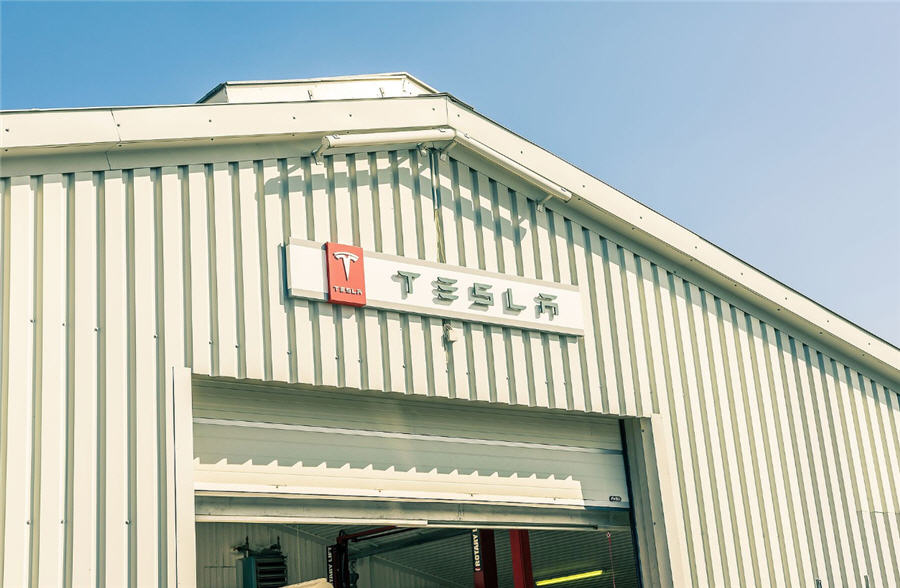Tesla shares jump as Musk delivers quarterly profit, cash

SAN FRANCISCO, Oct 24 (Reuters) – Tesla Inc reported a net profit, positive cash flow and fatter-than-expected margins for the latest quarter on Wednesday, delivering on Chief Executive Elon Musk’s promise to turn the electric carmaker profitable as higher production volumes of its new Model 3 began to pay off.
Tesla reiterated that it expected to repeat its positive net profit in the current quarter, helping the company’s shares up nearly 14 percent after hours.
The volatile Musk – who has often set unrealistic goals and deadlines that Tesla has failed to reach – surprised investors by delivering on his pledge to make Tesla profitable for only the third quarter in its 15-year existence, providing a triumphant end to a difficult quarter for the executive, whose leadership was openly questioned only weeks ago.
Tesla said it would begin taking orders in Europe and China for the Model 3 before the end of 2018, and said only 20 percent of North American reservation-holders had canceled their bookings. The Model 3 will begin to be sold in Europe next year, it said.
Musk has been under intense pressure to prove he can deliver consistent production numbers for the Model 3, seen as crucial to Tesla’s profitability and its ability to be a high-volume car producer.
Free cash flow of $881 million – also only the third time that number has been positive in Tesla’s history – was helped by a surge of new production of the Model 3 and lower capital expenditures.
While still below the production target it set for June of 5,000 Model 3s per week, the roughly 4,300 Model 3s the company is now averaging per week were enough to boost results.
“Production numbers earlier this month meant we already knew Tesla could churn out the cars,” said Nicholas Hyett, an analyst at Hargreaves Lansdown. “The question was whether it could it do it profitably, and even more importantly, could Musk wean the company off a constant flow of cash from investors. To say Tesla’s answer is emphatic is an understatement.”
(For a graphic on Tesla’s balance sheet and strategy, click tmsnrt.rs/2PPLXM5)
Surging past estimates
The results were a boost for the embattled company after a tumultuous quarter in which U.S. security regulators accused Musk of fraud for tweeting that he had secured funding for a deal to take the company private, which never materialized.
A settlement between Musk, Tesla and the U.S. Securities and Exchange Commission allows Musk to remain as CEO, but requires a new independent chairman to oversee an array of capital intensive new projects in 2019, from a factory in China to development of Tesla’s new Model Y SUV.
Musk had vowed since May that Tesla would be profitable in both the third and fourth quarters, and has repeated that the company would not need new capital from financial backers.
Tesla said earlier this month it built 53,239 Model 3 sedans in the quarter, in line with its target of 50,000 to 55,000 vehicles, and delivered 55,840 of the cars to customers.
More sales of the higher-priced versions of the Model 3 currently on offer, helped margins, which rose to over 20 percent in the quarter, Tesla said, above its projection of 15 percent margins. Lower labor hours per vehicle helped, as did lower material costs.
Total revenue more than doubled to $6.82 billion, beating analysts’ average estimate of $6.33 billion, according to Refinitiv data.
Tesla ended the quarter with $3.5 billion in cash after spending $510.3 million in quarterly capital expenses. It said cash would remain at least flat in the fourth quarter, despite a repayment of $230 million in convertible notes coming due.
Tesla reported a profit of $311.5 million, or $1.75 per share, for the third quarter ended Sept. 30, compared with a loss of $619.4 million, or $3.70 per share, a year earlier.
Excluding items, Tesla had a profit of $2.90 per share.
Tesla faces pressing cash needs at its Fremont, California factory, where the company is hoping to eventually increase its production rate to 10,000 Model 3s per week.
Three new vehicles are in development at Tesla: the Model Y, a new $200,000 Roadster and an electric heavy-duty truck that Musk unveiled last November.
Its sprawling Gigafactory battery factory outside Reno, Nevada is only partially complete, and plans for assembly plants in Europe and China are both big-ticket items on the horizon.
(By Alexandria Sage and Sonam Rai; Editing by Bernard Orr and Bill Rigby)
{{ commodity.name }}
{{ post.title }}
{{ post.date }}




Comments